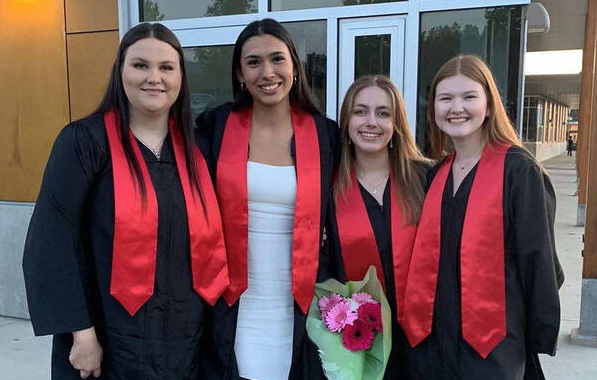PORT ALBERNI — Nine students have been awarded Alberni District Secondary’s first Indigenous studies diploma after completing Nuu-chah-nulth language courses and First Nations studies alongside their standard courses.
This is the first year that the school is offering the dual diploma program, with additional classes to come.
“[It’s] cool to be recognized for the work we put into learning about our culture,” said Sophia Bill of Tseshaht, who is an ADSS graduate with the dual diploma.
“The French immersion students get … recognized for being in French, so I thought it was kind of cool that they do it with our second language there as well,” added Saphia Lauder of Hupacasath, who also completed the diploma.
Bill and Lauder said they hope the diploma helps encourage students to continue to take Indigenous studies courses.
“I’m hoping that we see a few more students next year get the diploma,” Lauder said.
Currently, ADSS offers Nuu-chah-nulth language courses for Grade 8, 9, 10, and 11, BC First Peoples 12, and English First Peoples 12, said vice-principal Jeannette Badovinac.
Next year it will also be offering English First Peoples 11 and a carving course with a focus on West Coast imagery. The school hopes to add English First Peoples 10 in 2024-25, and is in the process of getting board approval for an Indigenous Leadership 12 class, Badovinac said.
According to the 2023-24 course planning guide, students who are active in their First Nation community — completing language studies, attending dance practice or performing at ceremonies — can also receive credits toward their Indigenous studies diploma.
“We have so many nations and students from those nations at our school,” Badovinac said. “We want our Indigenous kids to see themselves when they walk into our building.”
The vice-principal called getting the diploma a “huge accomplishment,” noting that it is equivalent to five courses.
Jackie Chambers, a student success teacher and co-chair of the Indigenous Leadership Team at ADSS, said that when these students first chose to take the First Nations courses, “there was no expectation of a diploma.”
“They chose those courses because they’re interested in [them] and it was something that they really wanted to do,” she added.
Student Natalie Clappis was surprised when she found out that she would receive a diploma for her studies.
“I didn’t know that was something they offered, but I also thought it was really cool that we would get that after taking the courses,” she said.
Chambers noted that these courses have been offered at ADSS for several years without the formality of the diploma. “Giving out a diploma lets our students know just how much we value their hard work and their achievement,” she said.
Erika Ingram, a language teacher at ADSS, pitched the idea for the Indigenous studies diploma to Chambers after seeing something similar at her previous school in the Okanagan.
“I saw how valuable it was for a public school to honour and recognize a focus area for student learning,” Ingram said.
Toward the start of the 2022-23 school year, the pair brought it to the Indigenous Leadership Team, where the idea was met with excitement.
“I think we’ve long understood that there’s different ways of knowing and different ways of learning and different values in terms of knowledge, but that’s not always reflected in our schools — yet,” said Ingram reflecting on the B.C. education system.
“I think that the next step is really to transform the way schools look to honor that,” she added. “It’s about recognizing not just the student but recognizing the whole community and recognizing that knowledge is valuable.”



